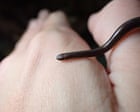
In recent months, two significant stories from different parts of the globe have emerged, reflecting both the resilience of nature and the advancements in sustainable agriculture. The quiet rediscovery of the world’s smallest snake in Barbados and remarkable growth in olive oil production in Portugal present uplifting narratives about our evolving relationship with the natural world.
The discovery in Barbados is a heartening reminder of nature’s tenacity. Conservationists have confirmed the presence of the Barbados threadsnake, a diminutive reptile not seen for two decades. The threadsnake, measuring only 10 centimeters and as slender as a strand of spaghetti, was last observed under a rock in the heart of the island during a meticulous ecological survey conducted by the Barbados Environment Ministry in collaboration with the conservation organization Re:wild. Initially feared to be extinct, the discovery illustrates a thriving, albeit elusive, population of this tiny serpent.
The ecological survey that led to the rediscovery was a part of ongoing efforts to preserve and monitor the island’s unique biodiversity. These initiatives provide valuable insight into the ecosystems of Barbados, demonstrating the importance of persistent conservation practices. Such findings rekindle hope among environmentalists and encourage further exploration into the lives of lesser-known species, whose survival reflects broader ecological health.
Meanwhile, in Southern Europe, Portugal is experiencing a noteworthy advancement in its agricultural sector. The country’s olive oil production has reached its second-highest yield since record-keeping began. This impressive achievement can largely be attributed to the mature intensive olive groves in the Alentejo region, which have proven to be remarkably productive. Last year saw Portugal’s olive production soar, reflective of the region’s commitment to sustainable agricultural practices and innovation within the industry.
Such growth within the agriculture sector not only supports local economies but also underscores the importance of adapting to climate change through modern farming techniques. The intensive olive-growing methods employed not only increase yield but also optimize water usage and enhance soil conservation, forming part of a broader strategy to ensure long-term agricultural sustainability.
The parallel narratives of the rediscovered snake in Barbados and the thriving olive oil production in Portugal collectively offer a narrative of hope and progress. They remind us of the delicate balance that must be maintained between human activity and environmental stewardship. While one story highlights the unexpected resilience of a tiny species, the other underscores the potential for human endeavors to coexist harmoniously with nature.
These developments encourage ongoing dialogue about the ways in which conservation and industry can be integrated to promote ecological health and economic prosperity. They illustrate that through mindful stewardship and innovative practices, both natural and human systems can flourish together. As we continue to discover and learn more about our world, these stories serve as gentle reminders of the possibilities that arise from attentive and caring stewardship of our shared environment.
Source: {link}
